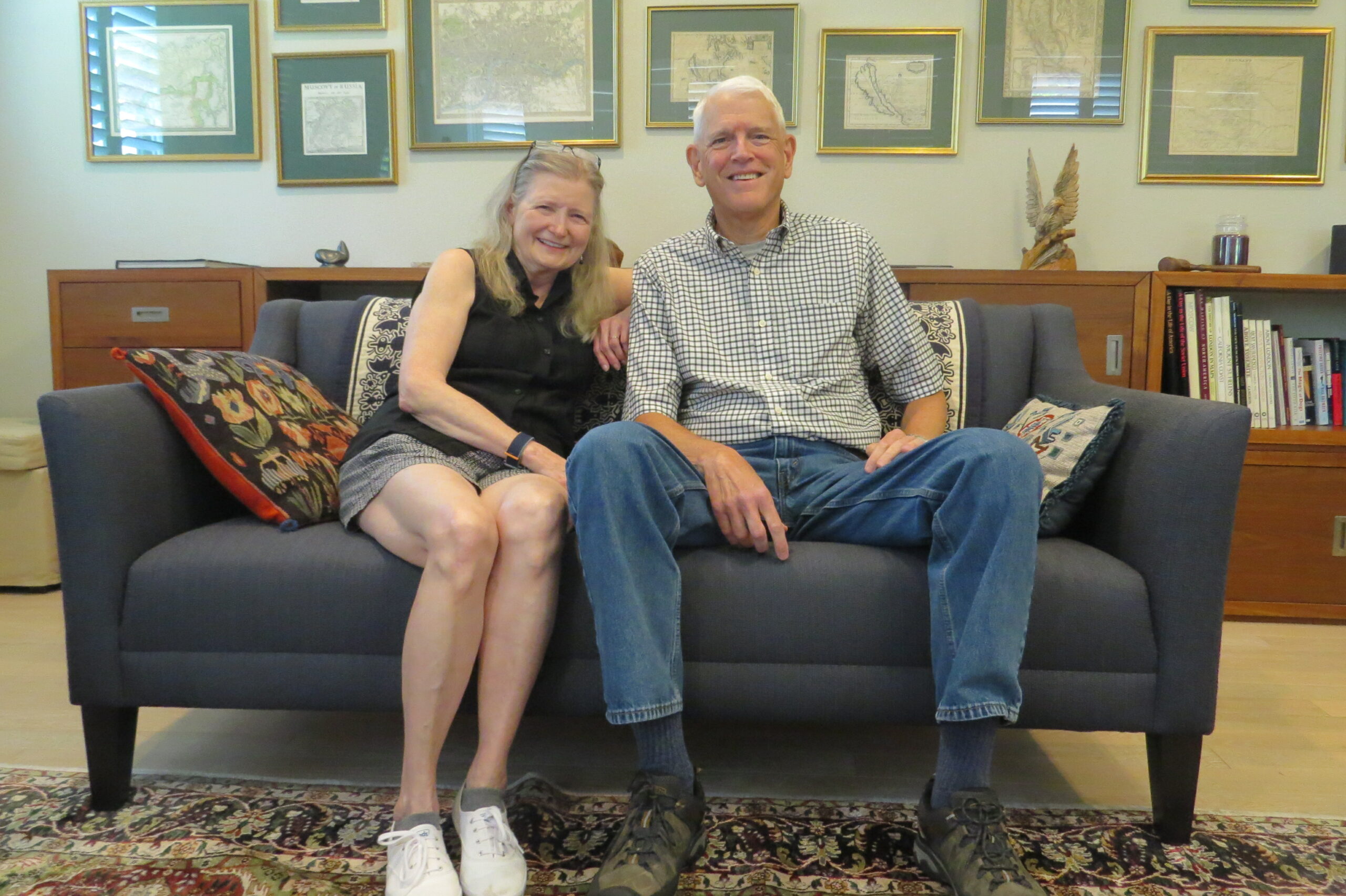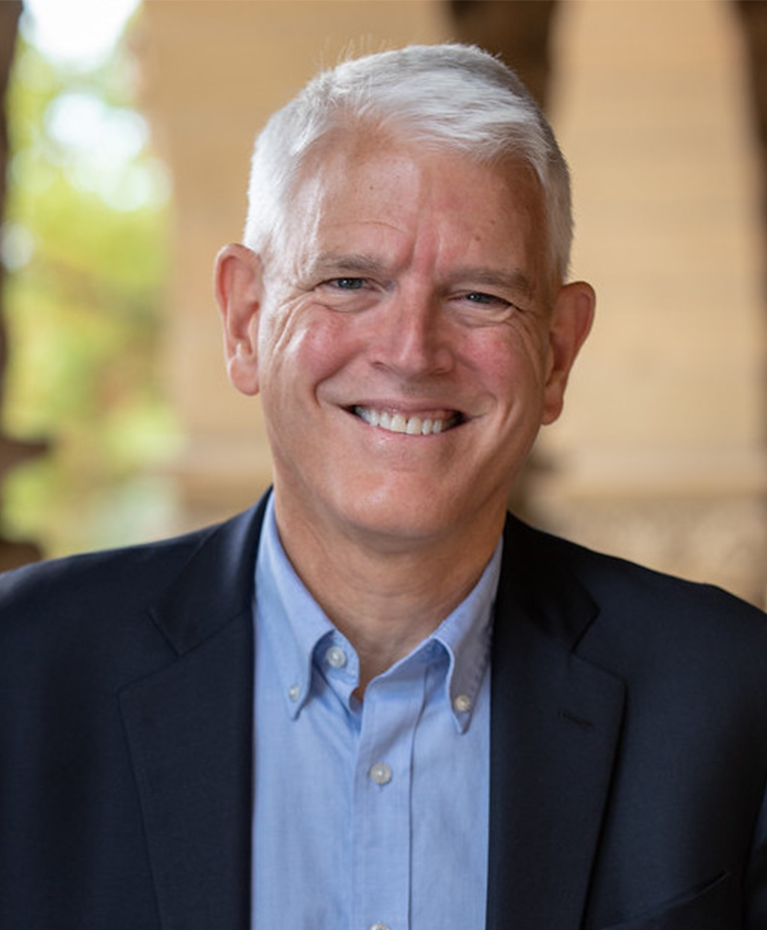Pifer was the American ambassador to Ukraine from 1998 to 2000
![]()

Marilyn and Steven Pifer in their Morgan Hill home. Photo by Ben Hayes
By Ben Hayes

Ben Hayes
Steven Pifer greets me at the door with a limp. He’d broken his kneecap en route to Kyiv three weeks ago and scrambling for hotel bomb shelters in the wee hours of the morning hadn’t done his injury any favors. “The nice thing about this,” he jokes about his injury, “is I got dispensation to use the elevator.”
Pifer was the American ambassador to Ukraine from 1998 to 2000. His house reflects it. Blue-and-yellow flags, Oval Office photos with Bill Clinton, and a ceremonial mace from Kyiv decorate his home in Morgan Hill, where he settled down after 27 years serving in Washington, D.C., and abroad.
Pifer enjoys the change of scenery. “Walk 12 minutes that way,” he says, “and I’m in vineyards and orchards. I like it here.” The former ambassador, though, is anything but retired in the larger sense. It’s because of his ongoing involvement in Ukrainian affairs that Morgan Hill Life publisher Marty Cheek and I are here for an interview.
Pifer’s time in the State Department began in 1978. He served his probationary years under President Carter, managed the arms control portfolio at the Moscow Embassy during the Reagan administration, and was a deputy assistant secretary of state in the Bush Jr. years. Pifer formally retired in 2004, but as he’d related at the door, that hasn’t kept him away from Ukraine.

Steven Pifer
Knee propped up on a couch cushion, he talks us through his time there earlier in March.
“Kyiv looked pretty normal,” he begins, “with a couple of exceptions. One was you saw more guys in uniform on the streets than I ever remember. In the building we got into, we had a chance to go and get a briefing from military intelligence. The buildings would be protected by sandbags or pill boxes. There were heavier guards there. When you would drive around, you’d see these tank barriers that were there in case they had to pull them in the street. Then there was the air raid. I’d never been in an air raid before. They said it was the worst that Kyiv had been hit with in six or seven weeks. Thirty-one missiles.”
He takes a second to set the scene: 3:15 a.m., officials ushering guests into a shelter under the hotel. “We had one guy with us who was British — he was kind of our facilitator. He basically was plugged in. They would send us reports. He said, ‘OK, the Ukrainians reported that the bombers left such and such air base,’ and so that gives you an approximate time, by the time they get to their launch points, when the missiles come in . . . He goes, ‘Yeah, the cruise missiles now are all reportedly turned toward Kyiv,’ and then I think we heard about five or six explosions, which we assumed were the air defenses engaging overhead.”
He worries for those who have undergone violence for two years now. “I remember talking to a former Ukrainian colleague at the embassy — this was early on in the war,” he recalls. “And she said one day she’d had to go to the bomb shelter five times in the night. That’s just got to be really draining.”
This visit was not a one-time event. Early in the interview, Pifer speculates on Zelensky’s reasons for passing up a consensus national government, based on a conversation in Kyiv he had “about three weeks before the major Russian invasion.”
I have to stop him there. “You were there three weeks before Feb. 24?” I ask incredulously.
“Jan. 30 to Feb. 2,” he replies in stride. He notes that during his trip, most Ukrainians didn’t believe there would be a major Russian attack, and something must have changed shortly after his departure.

The Russians, according to Pifer, were less prepared. “A lot of parts of the Russian military, I think, only learned that they were going in at the last minute. There were reports that the Ukrainians had captured some Russian soldiers who had been in the initial invasion force heading forward to Kyiv, and they said they thought they were in Belarus on an exercise. At 9 p.m., they were rousted out and told to suit up, before being given weapons and informed the operation would start at 4 a.m.”
He draws his conclusion: “I think (the Russians) seriously thought they would be welcomed as liberators.”
Pifer has alluded to continuing involvement in the conflict on both sides of the Atlantic throughout the interview, so I press him further. These days, he reveals, he’s part of a group of former U.S. ambassadors to Ukraine who are still active in current affairs.
“When I get back to Washington, I try to see people at the State Department, at the National Security Council, and try to push and pull them, trying to push the U.S. government to do a bit more, but that’s entirely on the outside. It’s based, I think, on our calculation, at least my own calculation (on) helping Ukraine prevail. This is very much in the national interest, setting aside my feelings about Ukraine.”
There’s a fraction of a pause as he collects his thoughts. “There’s also kind of a personal reason. Back in the 1990s, I was involved in the negotiations with Ukraine where they gave up what was at the time the world’s third largest nuclear arsenal.”
Part of the deal, Pifer explains, was that Russia committed to respect Ukraine’s sovereignty and not use force against Ukraine.
“We told the Ukrainians that if the Russians tried something, we would be supportive,” he says.
Pifer caveats by clarifying no official deals were made, then returns quickly to his decades-ago commitment. “We said we would do things,” he states firmly.
 He believes the U.S. is now living up to that commitment by providing Ukraine with arms and other support. He notes that in the early 1990s, there was a collective failure.
He believes the U.S. is now living up to that commitment by providing Ukraine with arms and other support. He notes that in the early 1990s, there was a collective failure.
“Both we in Washington, but also our Ukrainian counterparts in Kyiv, we didn’t foresee what would happen in 2014 or 2022. But that’s kind of secondary,” he says briskly. “The main reason is there’s an American interest there, and that Europe becomes a much more dangerous place if the Ukrainians lose.”
Pifer has a Zoom meeting with the Council on Foreign Relations, so after a generous hour and a half, he shows us out. We shake hands, exchange numbers, and walk out into the sun. The door swings shut as the former ambassador limps back to his study to catch the call. Two decades after leaving the foreign service, Steven Pifer hasn’t slowed down in his commitment to the people of Ukraine.
Ben Hayes is a 2023 graduate of Ann Sobrato High School. He is studying at Merton College in Oxford University. This column was originally published June 6 in the Cherwell, Oxford’s oldest student newspaper. The full version can be found at www.cherwell.org/2024/06/06/the-former-ambassador






